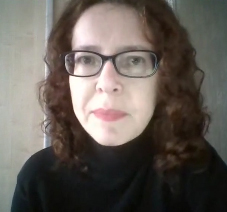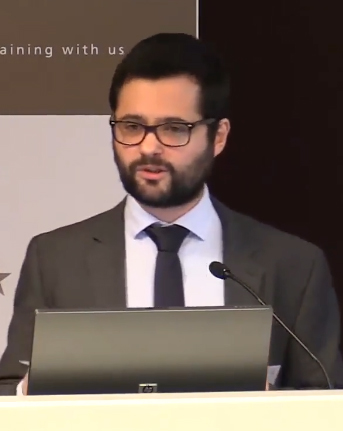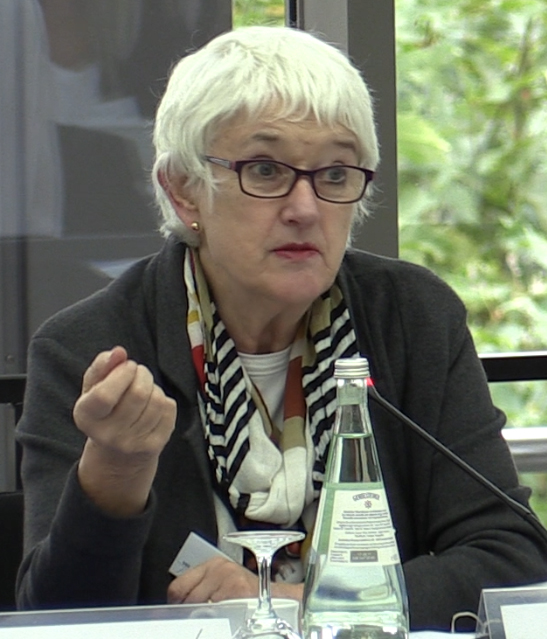Fundamental Rights Impact Assessment (FRIA) under the EU AI Act: too much, too little or just right?
This presentation gives insight into the fundamental rights impact assessment (FRIA) under the EU AI Act. In addition to introducing the history of the FRIA, it discusses when FRIAs are necessary and how they should be conducted. Lastly, the presentation gives insights into the core challenges regarding fundamental rights protection and the people performing FRIAs.
e-Presentation | April 2025 | Learning time: 34 minutes
e-Presentation by Francesca Palmiotto, Assistant Professor, IE Law School, Madrid.
This presentation, on the one hand, critically evaluates the EU AI Act and the Council of Europe Framework Convention on AI. On the other hand, it also gives insights as to how individuals can use the AI act to protect their fundamental rights.
e-Presentation | April 2025 | Learning time: 28 minutes
e-Presentation by Daniel Leufer, Senior Policy Analyst, Access Now, Brussels a.
This presentation gives an introduction to the use of AIS in public administration. Using the example of the Netherlands as a case study, it demonstrates the risks for human rights when using AIS, specifically the right to non-discrimination.
e-Presentation | April 2025 | Learning time: 30 minutes
e-Presentation by Maria Giuliana Civinini, President of Tribunal of Pisa (retired), President of the Working Group on Cyberjustice and Artificial Intelligence (CEPEJ-GT-CYBERJUST), Pisa.
This presentation gives an introduction to the use of AIS in public administration. Using the example of the Netherlands as a case study, it demonstrates the risks for human rights when using AIS, specifically the right to non-discrimination.
e-Presentation | April 2025 | Learning time: 32 minutes
e-Presentation by Alexander Laufer, Senior Researcher and Policy Officer, Amnesty International, Amsterdam.
This presentation gives insights into which AI tools are currently being used in legal practice. In addition, it outlines how technology is impacting and changing legal practice.
e-Presentation | April 2025 | Learning time: 38 minutes
e-Presentation by Peter Homoki, Senior Counsel, CMS, Budapest .
This presentation addresses the oversight of AI-supported judicial decision-making. It analyses human oversight under the EU AI act as well as the ethical use of AI in judicial decision-making and the challenges connected thereto.
e-Presentation | April 2025 | Learning time: 23 minutes
e-Presentation by Isabella Banks, Researcher, University of Amsterdam, Amsterdam.
This presentation outlines the main features of cyberviolence and how the legal frameworks of the EU and the CoE address it. In addition, the presentation gives an update on key cases involving cyberviolence before the ECtHR.
e-Presentation | March 2025 | Learning time: 28 minutes
e-Presentation by Anca Ciupa, Senior Manager, WAVE Network, Vienna.
This e-presentation focuses on the investigation and prosecution of cyber violence. Key aspects include the collection and handling of electronic evidence, balancing privacy concerns with the investigation, as well as the use of OSINT and its admissibility at court.
e-Presentation | March 2025 | Learning time: 28 minutes
e-Presentation by Ana Gogovska Jakimovska, Prosecutor, Public Prosecutor’s Office, Skopje .
This e-presentation introduces the key provisions and procedural safeguards within the anti-SLAPP directive. Furthermore, it assesses its current state of implementation and discusses points for improvement.
e-Presentation | February 2025 | Learning time: 29 minutes
e-Presentation by Alexis Anagnostakis, Barrister, Anagnostakis Law Offices, Athens.
The presentation discusses how the public policy exception under the Brussels regime can be leveraged as protection for the freedom of expression. A focal point is the principle of mutual recognition of judgments under Brussels I and the role of the public policy clause in SLAPP cases.
e-Presentation | February 2025 | Learning time: 27 minutes
e-Presentation by Zuzanna Nowicka, Lawyer, Free Speech Programme, Helsinki Foundation, Warsaw.
The presentation discusses the role of EU laws, specifically the GDPR, DSA and EMFA, regarding surveillance and privacy concerns. A focus is on the regulation of spyware and the protection of journalists and their sources.
e-Presentation | February 2025 | Learning time: 44 minutes
e-Presentation by Chloé Berthélémy, Senior Policy Advisor, EDRi, Brussels.
The presentation focuses on the protection of media freedom in the digital context. It defines the notions of ‘journalist’ and ‘media’ in the digital sphere and the lines of journalistic privileges regarding data protection. The Austrian data protection law serves as case study in how to balance media privilege and data protection.
e-Presentation | February 2025 | Learning time: 32 minutes
e-Presentation by Krisztina Rozgonyi, Senior Scientist, Austrian Institute of Technology (AIT); Institute for Comparative Media and Communication Studies, Austrian Academy of Sciences, Vienna.
The following e-presentation discusses the right to an independent living, emphasising the process of deinstitutionalisation and its alternatives. The presentation also discusses the role of EU structural funds in this process and potential community-based alternatives.
e-Presentation | November 2024 | Learning time: 32 minutes
e-Presentation by Kamil Goungor, Policy and Movement Support Officer at European Network on Independent Living, Brussels.

This e-presentation provides an overview of the rights applicable to trans and intersex individuals under the ECHR. It discusses the topics of gender identity and recognition under Art. 8 ECHR (including the right to health), the right to marry under Art. 12 ECHR and the right to non-discrimination under Art. 14 ECHR.
e-Presentation | November 2024 | Learning time: 28 minutes
e-Presentation by Lena Holzer, Assistant Professor, University of Cambridge.

This presentation discusses the ECtHR’s case Semenya v Switzerland (App. no. 10934/21Semenya). To provide context to the judgment, this presentation not only discusses the proceedings at the ECtHR, but also illustrates the roles and powers of sport governing bodies and elaborates on the consequences of the judgment.
e-Presentation | November 2024 | Learning time: 38 minutes
e-Presentation by Patricia Wiater, Professor, FAU - University of Erlangen-Nürnberg; Human Rights Advisor, German Olympic Committee, Nürnberg.

This presentation gives an introduction to the phenomenon of secondary victimisation. It outlines its different forms, the jurisprudence of the ECtHR, and international legal acts to showcase ways of protecting women against it.
e-Presentation | March 2024 | Learning time: 30 minutes
e-Presentation by Eva Fechner, Legal Advisor, Slachtofferhulp Nederland, Utrecht & Robin Fontijne, Strategic Advisor, Slachtofferhulp Nederland, Utrecht.

This presentation introduces the current EU legal framework to protect women against violence. While the main focus is on how to issue and then ensure the mutual recognition of protection decisions, it also reviews the role of the Victim’s Directive for the protection against violence.
e-Presentation | March 2024 | Learning time: 51 minutes
e-Presentation by Lucie Hrdá, Founding Partner, HRDÁ LEGAL s.r.o., Prague.

This presentation examines the phenomenon of cyberviolence and the challenges of protecting women from it.The presentation maps the different definitions and initiatives on EU level as well as national level.
e-Presentation | March 2024 | Learning time: 33 minutes
e-Presentation by Eleonora Esposito, TF-GBV Researcher, University of Navarra, Pamplona and Project Manager (2021-2023), European Institute for Gender Equality (EIGE), Vilnius.

This e-presentation presents an overview of the recent judgments of the ECtHR on the ill-treatment of LGBTIQ+-individuals by police and private individuals. Focus is on the different obligations on states, including concerning the failure to provide protection, long and ineffective investigations as well as the lack of legislation or the failure to investigate at all.
e-Presentation | December 2023 | Learning time: 35 minutes
e-Presentation by Denitsa Lyubenova, Lawyer, Head of the Legal Programme, LGBT Deystvie, Sofia.

This e-presentation provides an introduction to the concept of victimisation in EU law (Directive 2000/43, Directive 2000/78, Directive 2006/54), followed by an overview of how Member States address this issue in their national legal systems.
e-Presentation | December 2023 | Learning time: 41 minutes
e-Presentation by Margarita S. Ilieva, Strategic International Equality and Human Rights Litigator and Analyst, Sofia.

The speaker discusses how the Digital Services Act addresses the questions of transparency and accountability of algorithms from the legal and practical perspective. In addition, ways of coping with the risks of algorithms, as laid down in the DSA, are analysed.
e-Presentation | November 2022 | Learning time: 22 minutes
e-Presentation by Etienne Papin, Lawyer, NEXT avocats, Paris.

The speaker scrutinizes obligations which should be fulfilled by organisations when implementing DSA. In doing so, he identifies rules to be applied to various categories of intermediaries.
e-Presentation | November 2022 | Learning time: 32 minutes
e-Presentation by Christian Schröder, Partner, Orrick Herrington & Sutcliffe LLP, Düsseldorf.

The speaker discusses the legal issues around moderation of contentious speech on social media platforms. He touches upon the role of the DSA (Digital Services Act) and the evolution of hate speech in international human rights law.
e-Presentation | November 2022 | Learning time: 30 minutes
e-Presentation by Jacob Mchangama, Director, Justitia, Copenhagen.

Cathrine Bloch Veiberg presents the UN Guiding Principles on Business and Human Rights and explains the responsibilities of businesses according to those guidelines. She outlines challenges related to human rights due diligence of digital technologies. Cathrine Bloch Veiberg also highlights key questions to be asked by businesses to counteract the challenges they are facing.
e-Presentation | April 2022 | Learning time: 25 minutes
e-Presentation by Cathrine Bloch Veiberg, Senior Advisor, Danish Institute for Human Rights.

Grégory Thuan reviews the challenges posed by COVID-19 to individual human rights in France with a critical overview of the legal framework within which the national lockdown took place in spring 2020. The presentation focuses on instances of possible discrimination during police control operations.
e-Presentation | January 2021 | Learning time: 37 minutes
e-Presentation by Grégory Thuan dit Dieudonné, Lawyer; President of the Human Rights Commission of the European Lawyers’ Union (UAE), Strasbourg.

In this presentation, Maroš Matiaško clarifies what access to justice means for persons with disabilities within the framework of the Convention on the Rights of Persons with Disabilities (CRPD) and the ECHR. Maroš Matiaško explains how these two instruments promote the active involvement and participation of persons with disabilities in the administration of justice.
e-Presentation | January 2021 | Learning time: 33 minutes
e-Presentation by Maroš Matiaško, Chair of Forum for Human Rights, Prague.

Antoine Buyse examines States’ responses to the Covid-19 pandemic and its impact on limiting public gatherings, as well as freedom of movement. If restrictions based on public health concerns are justified, they must be necessary and proportionate considering the circumstances. Particular attention is paid to whether the restrictions were time-bound, applicable for the duration of the pandemic and proportionate.
e-Presentation | January 2021 | Learning time: 39 minutes
e-Presentation by Antoine Buyse, Professor, Utrecht University School of Law; Director, Netherlands Institute of Human Rights (SIM).

To contain and mitigate the threats of the COVID-19 pandemic, governments, public and private organisations have taken a number of measures to collect and process different types of personal data – including health data. In his presentation, Emanuele
Ventrella gives indications as to where to draw the line between safety measures benefiting public health and invasive controls impacting the privacy of individuals.
e-Presentation | January 2021 | Learning time: 23 minutes
e-Presentation by Emanuele Ventrella, Data Protection Advisor at Trilateral Research.
Watch the premium version Purchase the premium version Watch the free version

Barbora Bukovska presents an overview of the risks pertaining to freedom of expression in an online environment, emphasising the responsibility of online actors.
e-Presentation | December 2020 | Learning time: 42 minutes
e-Presentation by Barbora Bukovska
Watch the premium version Purchase the premium version Watch the free version

Jeremy McBride presents international human rights standards and limitations to the freedom of expression in times of emergency and COVID-19-related hate speech.
e-Presentation | December 2020 | Learning time: 26 minutes
Jeremy McBride
Watch the premium version Purchase the premium version Watch the free version

Murtaza Shaikh presents the UN normative framework relating to online hate speech and the gaps in the legal framework. He concludes his presentation by reviewing the challenges of online hate speech with regard to minorities.
e-Presentation | December 2020 | Learning time: 31 minutes
Murtaza Shaikh
Watch the premium version Purchase the premium version Watch the free version

Murtaza Shaikh presents the narrower category of incitement to hatred, discrimination and violence as contained in Article 20 ICCPR and how it can be interpreted and translated into hate crime legislation on a national level.
e-Presentation | December 2020 | Learning time: 30 minutes
Murtaza Shaikh
Watch the premium version Purchase the premium version Watch the free version

Victoria de Posson explores tech companies’ role in addressing gender-based hate speech, the state of play and what should be done to improve the situation.
e-Presentation | December 2020 | Learning time: 20 minutes
Victoria de Posson
Watch the premium version Purchase the premium version Watch the free version
Päivi Leino-Sandberg gives an overview of the basic elements of the right to information and transparency, especially focusing on Regulation 1049/2001. She uses many cases to point out current trends and developments in different areas such as transparency
in legislative process, data protection and the role of EU agencies.
e-Presentation | November 2019 | Learning time: 55 minutes
Päivi Leino-Sandberg
Watch the premium version Purchase the premium version
Laura Drechsler explains the differences and similarities between the GDPR and other EU rights by using a great variety of case law. By comparing several rights and their origins to one another, she points out interesting parallels and differences.
e-Presentation | November 2019 | Learning time: 31 minutes
Laura Drechsler
Watch the premium version Purchase the premium version

Anne Friel explains how access to environmental information is ensured through the Aarhus Convention and how these rules interact with the EU regulations that guarantee general access to information (such as Regulation (EC) No. 1049/2001). The focus is on the differences and specifications that arise when dealing with information in environmental matters.
e-Presentation | November 2019 | Learning time: 45 minutes
Anne Friel
Watch the premium version Purchase the premium version

After presenting the legal framework and some current observations, Graham Smith explains how access to documents works in practice and which problems regularly occur. His focus is on future prospects and possible ways of development in this area of law.
e-Presentation | November 2019 | Learning time: 49 minutes
Graham Smith
Watch the premium version Purchase the premium version

Clive Baldwin presents the regulation of free speech and hate offences under international law, in particular under the International Covenant on Civil and Political Rights. He further presents the principles contained in the United Nation’s Rabat Plan of Action concerning the prohibition of hate speech. He lastly gives a critical overview of the recent case law of the European Court of Human Rights on blasphemy laws.
e-Presentation | November 2018 | Learning time: 33 minutes
Clive Baldwin
Watch the premium version Purchase the premium version Watch the free version

Emma Llansó explains the problem of private law enforcement when addressing online hate speech: the enforcement of Terms of Service/Community Guidelines and the calls on private actors to interpret, apply, or enforce the law. She gives an overview of the models of private law enforcement and identifies accountability as its main problem. She clarifies the implication for the European Convention of Human Rights, especially Article 10 and 13, and broaches the issue of automation in content moderation.
e-Presentation | November 2018 | Learning time: 43 minutes
Emma Llansó
Watch the premium version Purchase the premium version Watch the free version

Peter Stern presents the community standards as well as the principles and the process of policymaking at Facebook, in particular with regard to hate speech. He explains the procedure for tracking down and removing harmful content on social media and puts this into a European context.
e-Presentation | November 2018 | Learning time: 42 minutes
Peter Stern
Watch the premium version Purchase the premium version Watch the free version
e-Presentation | November 2017 | Learning time: 54 minutes
Päivi Leino-Sandberg
Watch the premium version Purchase the premium version Watch the free version
e-Presentation | November 2017 | Learning time: 55 minutes
Katarzyna Szychowska
Watch the premium version Purchase the premium version Watch the free version

e-Presentation | November 2017 | Learning time: 25 minutes
Vitor Teixeira
Watch the premium version Purchase the premium version Watch the free version

e-Presentation | October 2014 | Learning time: 47 minutes
Yves Van Gerven

e-Presentation | October 2014 | Learning time: 60 minutes
Michal Bobek
e-Presentation | November 2013 | Learning time: 34 minutes
Prof Jeff Kenner

e-Presentation | October 2013 | Learning time: 31 minutes
Nuala Mole
e-Presentation | October 2013 | Learning time: 31 minutes
Kris Pollet
e-Presentation | October 2013 | Learning time: 47 minutes
Constantin Hruschka















